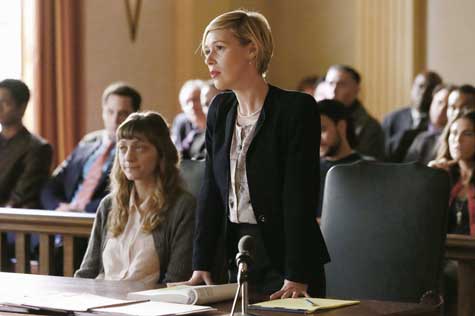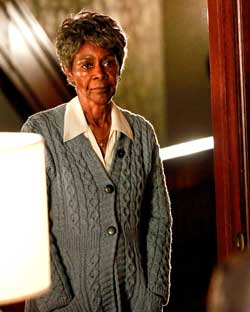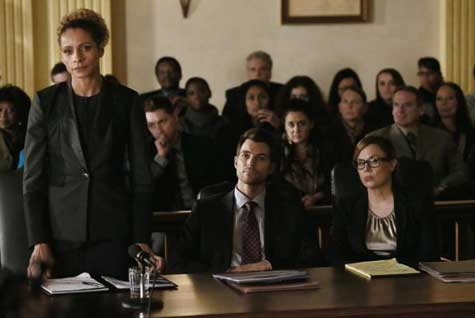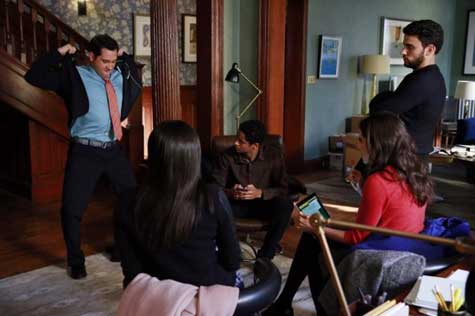
The characters on How To Get Away With Murder might not be solving all their cases—in fact, Lila’s murder gets unofficially reopened this week—but the show itself has solved its biggest problem. The show is developing its characters.
Murder is a huge ensemble show, with Annalise Keating (Viola Davis), her students, her coworkers, and a handful of auxiliary love interests for everyone. Yet, with a few exceptions, the show has always chosen to focuse on speeding through its plot rather than making us care about the people. The end result is a lot of plot that I’ve been caring less and less about. Luckily, this episode serves as a shot in the arm, due in large part to Keating’s mother (Cicely Tyson) making an appearance.

Throughout the episode, Keating and her mother never advance the murder plot that usually drives the show. Instead, we learn about Keating’s old life. She changed her name from Anna Mae in order to fit in, and she resents her mother for not helping her when her uncle abused her during childhood. It’s dark material handled well by both actors, and a great improvement on the show’s typical drama.
Meanwhile, the main case offers a similarly unexpected characterization, this time for Bonnie (Liza Weil). As Keating’s associate, she’s the one who must step up to take a case while Keating is disposed. In her defense of a nurse accused of raping her patient, Bonnie is trying to fill Keating’s shoes, and her struggle is a large part of the episode. At first making an embarrassing mistake in court, and then proving her ability to build up evidence, but then failing to save an important part of her case: she goes back and forth. Her biggest failure is in missing the fact that the nurse and her patient did have consensual sex, a fact that the nurse holds back.
All the clients on this show are fairly bad at self-preservation. The nurse really should have admitted she had consensual sex, since Bonnie’s case all along hinged on proving that her accuser intended to claim rape in order to get a settlement from the hospital. If they had been forthright, it could have improved their case. Instead, it looks as if they were lying and the client can’t be trusted.
People making poor decisions is an easy way to add drama to a story, and if it’s the clients who make all the dumb moves then the protagonists get to look better. Not to say that the protagonists don’t make terrible choices too, but they’ve been keeping that to a minimum this episode.

I was almost convinced that, unlike Keating, Bonnie wouldn’t be able to win the case, but she pulled through to prove that the patient accusing her client was in cahoots with the hospital’s lawyer and planned on splitting the settlement. The tension of Bonnie’s struggle was a lot more compelling because of the possibility of failure, and since it’s the most screen time she has ever gotten in an episode, it went a long way towards fleshing out her character.

Meanwhile, Conner’s (Jack Falahee) subplot sees him developing his “deep and varied emotional issues,” as Michaela (Aja Naomi King) calls them. His ex, Oliver (Conrad Ricamora), wants to meet Conner’s friends before recommitting to their relationship, which leads to one of the more heart-warming scenes: the students meet at a bar with Oliver and act like normal friends. I’m not sure I have seen them all smiling over anything. In a show that loves cynicism as much as this one, it’s nice to see a relaxing scene. And it probably means that the show’s setting up something much worse.

Meanwhile, Laurel (Karla Souza) and Wes (Alfred Enoch) connect over his investigation of Rudy, learning that his “nervous breakdown” was actually a drug overdose, and he’s in a mental institution now. Wes and Laurel decide to visit him, hiding the fact from Rebecca (Katie Findlay), who has lied about Rudy in the past.
In the final five minutes, we get all the plot development saved up from the rest of the episode. There, we learn Keating has a plan to save the lover she framed for Sam’s death, we learn that Rudy knows something about Lila’s murder, and we learn that Rebecca has been tracking Wes’ phone and knows that he knows about her involvement.
I’m pulling for Rebecca to be a Moriarty-level criminal mastermind. After all, double jeopardy already protects her from being tried for murdering Lila. If she planned that out, she’s a genius.
Regardless, this episode is just what the show needed: some of the strongest character development it has ever had, coupled with a satisfying amount of plot to propel us into the season’s end game.
Adam Rowe is an information writer and science history enthusiast who runs 70sscifiart.tumblr.com. Follow him @AdamRRowe.
